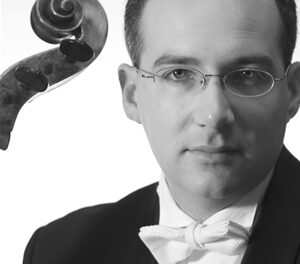The Duke Coffeehouse was the perfect setting on for the Wet Ink Ensemble‘s season farewell to its host university at the end of the first year of its Durham residency. The program was presented under the banner of the Music Department’s new music series, Encounters: with the music of our time. A stage lined with computers, instruments, chords, and stands gave insight to incoming patrons of what the night would hold.
The Duke Coffeehouse is a unique place, founded in 1981 by student housing for academic and residential experimentation; it was Duke’s first non-Greek selective living group. During the week it is a place for students to congregate, socialize, and study while enjoying fresh-brewed coffee. However, on the weekends, the coffee house is turned into a live venue for local and traveling musicians. The high ceiling, eclectic furniture, and walls lined with colorful paintings of spaceships are just a sampling of the features that makes this a unique venue.
The Wet Ink Ensemble is a New York-based music collective. Their mission is to create innovative programs that allow musicians to continue to grow and create new American music. The ensemble was founded in 1988, and they have presented nearly 100 concerts by living artists as well as advocating for adventurous programming of contemporary music.
The first set, which resembled a traditional concert, presented new works by graduate students. The first, D. Edward Davis’ “coo coo,” is scored for violin and live electronics. Violinist Josh Modney played beautiful variations on “The Coo Coo Bird,” based on an Appalachian-English folk melody. This piece was particularly intriguing because fragments of the violin line were excerpted by the computer, then arranged and rearranged into randomized groups and clusters that created a dense rhythmic grid. “Chain Shift” by Bryan Christian is scored for the instruments of the Wet Ink Ensemble: contrabass flute, piccolo, tenor saxophone, percussion, voice, violin, and electronics. The text of the voice is a reflection on the 45th stanza of Alexander Pushkin’s Eugene Onegin. Christian explains that a chain shift is a linear movement along a phonological scale. In this piece he incorporates an abstract idea and takes multiple dialectical glances at the opening word: “enough.” There are wonderfully quiet moments along with louder sections that combine the music of past centuries with contemporary ideas. The incorporation of live instruments and technology is a fantastic representation of the new artistic methods available to current composers.
The second set came complete with a full set change and offered a full dance floor accompanied by electronic beats with hip-hop, dubstep, and techno influences. Alex Kotch’s “Dissertation Dance Piece” (which really is his dissertation) offered wonderful beats and smooth transitions. The set featured members of Wet Ink and guests Erin Lesser, flute, Alec Mincek, saxophone, Kate Soper, voice, Sam Pluta, sound engineer, Marisa Byers, clarinet, Rachael Elliot, bassoon, Jamie Keesecker, horn, Don Eagle, trumpet, Mike Kris, bass trombone, and Verena Mösenbichler-Bryant, conductor. It was a thrilling experience to see the live performance of new music by a composer so passionate about his work
Following Alex Kotch’s set, local DJs Beat Report and Treee City finished off the evening.
It was evident that the Duke graduate students are quite talented and involved with their work. The coffeehouse performance was a great opportunity for the community to see and hear what is available in the new realm of contemporary American music.












